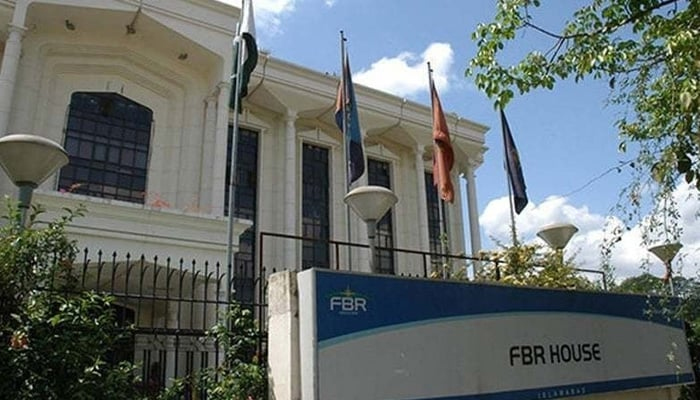FBR revamp plan means 1,000 changes to tax laws, rules
ISLAMABAD: The proposed FBR revamp if fully implemented will require over 1,000 changes to existing tax laws and rules, so any half-baked strategy might create unimaginable chaos for the state.
There are two options, as the current proposed plan would require the interim government either to repeal the FBR Act 2007 completely or bring in extensive amendments through ordinance, as under this law, the board-in-council is a legal forum and all FBR members are in this council. The chairman is one of the members of this council, and all powers used by the members have been delegated to them, including the chairman, by that board-in-council.
Under Section 5(1) of the FBR Act, the board, through the board-in-Council, is authorised to transfer and post any official of the board (FBR). Further, the board-in-council has authorised the FBR chairmanfor such transfers and postings.
Top official sources pointed out on Thursday that there is a valid question whether the current caretaker setup is empowered to amend more than half a dozen laws in the absence of parliament or just window dressing will be done through the machine of ordinances where the FBR has been assigned legal jurisdictions.
The second question arises whether the caretaker minister took the IMF and World Bank into confidence before proposing drastic changes to the tax system of the country.
The caretaker Minister for Finance, Dr Shamshad Akhtar, has so far not bothered to take the public into confidence, so no details of the exact proposed plan were shared to get feedback.
In such a fluid situation, the FBR officers are expressing their fears that if such a half-cooked summary was approved by the federal cabinet without getting feedback from the public, tax officials, and independent experts, the tax system would come to a standstill, creating unimaginable chaos for the fiscal state of affairs of the country.
According to the details gathered by The News, there would be a need to amend laws and rules once this new structure of tax machinery was in place. Without all such amendments to all relevant tax laws and tax machinery, the tax system would become at a standstill for all practical purposes and jeopardise the tax collection streams. There will be a requirement to bring 263 changes to the Income Tax Ordinance 2001, while 154 changes will become mandatory in the Income Tax Rules.
There will be a requirement of 131 changes to the Sales Tax Act 1990, and 171 changes to the GST rules will have to be incorporated.
In the Federal Excise Act (FED), there will be a requirement of 90 changes, while in the FED rules, the government will have to bring in 55 changes. In the Customs Act of 1969, the FBR will have to amend 156 changes to the law.
On top of this, FBR contacted this scribe and said that the Inland Revenue Service (IRS) officers were expressing their concerns over the proposed plan.
When this scribe requested to share details of the plan through the minutes of the inter-ministerial meeting under the aegis of the SIFC, the official replied that the minutes of the meeting were the domain of the Finance Ministry.
The official added in the same breath that the Ministry of Finance had issued a press statement a few days ago.
This scribe reminded him that there was no substantial information about the proposed restructuring plan, so how could the government justify such huge steps based on a mere few wording statements issued by the Ministry of Finance having no details at all in them?
This scribe sent out a question to the FBR chairman, seeking the viewpoint on the proposed plan but got no reply till the filing of this report.
-
 'A Very Special Visitor' Meets Queen Camilla At Clarence House
'A Very Special Visitor' Meets Queen Camilla At Clarence House -
 Jodie Turner Smith Shares One Strict Rule She Follows As A Mom
Jodie Turner Smith Shares One Strict Rule She Follows As A Mom -
 Hailey Bieber Reveals KEY To Balancing Motherhood With Career
Hailey Bieber Reveals KEY To Balancing Motherhood With Career -
 Photo Of Jay-Z, Other Prominent Figures With Jeffrey Epstein Proven To Be Fake
Photo Of Jay-Z, Other Prominent Figures With Jeffrey Epstein Proven To Be Fake -
 Hillary Clinton's Munich Train Video Sparks Conspiracy Theories
Hillary Clinton's Munich Train Video Sparks Conspiracy Theories -
 Fans Slam Talk Show Host For 'cringe' Behavior In Chris Hemsworth Interview
Fans Slam Talk Show Host For 'cringe' Behavior In Chris Hemsworth Interview -
 Woman Jailed Over False 'crime In Space' Claim Against NASA Astronaut
Woman Jailed Over False 'crime In Space' Claim Against NASA Astronaut -
 James Van Der Beek’s Close Pal Reveals Family's Dire Need Of Donations
James Van Der Beek’s Close Pal Reveals Family's Dire Need Of Donations -
 Prince William And Harry's Cousins Attend 'Wuthering Heights' Event
Prince William And Harry's Cousins Attend 'Wuthering Heights' Event -
 Hailey Bieber Turns Heads Just Hours After Major Business Win
Hailey Bieber Turns Heads Just Hours After Major Business Win -
 King Charles' Andrew Decision Labelled 'long Overdue'
King Charles' Andrew Decision Labelled 'long Overdue' -
 Timothee Chalamet 'forever Indebted' To Fan Over Kind Gesture
Timothee Chalamet 'forever Indebted' To Fan Over Kind Gesture -
 Columbia University Sacks Staff Over Epstein Partner's ‘backdoor’ Admission
Columbia University Sacks Staff Over Epstein Partner's ‘backdoor’ Admission -
 Ozzy Osbourne's Family Struggles Behind Closed Doors
Ozzy Osbourne's Family Struggles Behind Closed Doors -
 Dua Lipa Claims Long-distance Relationship 'never Stops Being Hard'
Dua Lipa Claims Long-distance Relationship 'never Stops Being Hard' -
 BTS Moments Of Taylor Swift's 'Opalite' Music Video Unvieled: See Photos
BTS Moments Of Taylor Swift's 'Opalite' Music Video Unvieled: See Photos




